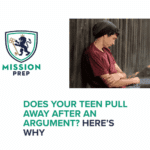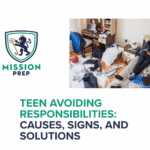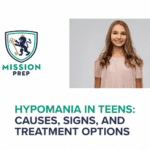Teen Irritability: Signs, Triggers, and Effective Support Strategies

More than any other time in recent decades, teenagers today are under a lot of stress. Whether it be school, social interactions, family dynamics, extracurricular activities, or even medical issues. The pressure to always do the right thing and the fear of negative consequences upon failure are more than enough to impact a teen’s mood.
We all know that mood swings can be common in adolescence, but what happens when these become a little too extreme? Severe teen irritability goes beyond “typical” teen behaviors, potentially impacting their relationships, academic performance, and overall well-being.
If you’re concerned that teen irritability is overriding your child’s ability to function daily, professional support may be able to help you get to the root of the problem. This article can also help you better understand teen irritability by covering:
- What teen anger and irritability is
- How to recognize irritability in adolescents
- Causes of irritability in teens
- Teen mental health support options for irritability
- Where to find professional support

Understanding Teen Anger and Irritability
In addition to its link to anger, irritability is also closely related to teen anxiety and anxiety disorders. As such, it’s common for parents to bring their teens to a mental health specialist to address concerns about anger and irritability.
Having said as much, it may be important to be able to tell the difference between “typical” teen irritability and when it’s a sign of something deeper. We cover this distinction in the next section.
Recognizing Irritability in Adolescents
Irritability can be displayed in different ways depending on the teen at hand, which can make it challenging to know when there’s a significant problem. So, being able to identify the signs of adolescent irritability can be important for both teens and caregivers.
If you’re having trouble recognizing irritability in adolescents, consider some of the following symptoms (outlined in self-report measures of oppositionality):2
- Excessive arguing with peers and adults: When teens are constantly engaging in interpersonal conflicts in school or at home, this is often a red flag for severe irritability. In addition, many of these arguments tend to be about inconsequential things. If their reaction to small issues is blown out of proportion, this may demonstrate emotional dysregulation.
- Showing sudden changes in mood and feelings: As previously mentioned, mood swings are common during adolescence. However, if you notice your teen going from feeling happy to sad or angry multiple times throughout the day, it might be time to consider why. Such quick switches in mood may be an early sign of a mood disorder, such as bipolar disorder.
- Being disobedient at school: Refusing to follow rules at school and acting out in ways that are disruptive to the school environment are signs of severe irritability. This can include a range of behaviors from not completing homework, talking during class, or even vandalism.
- Disobeying parents or caregivers: Although it’s expected for teenagers to disobey parents from time to time, if your teen is constantly defying rules at home, this can become a significant problem. Disobedience may include staying out past curfew, refusing to eat dinner as a family, or not completing household chores, among other behaviors.
Noticing a couple of these signs may indicate that intervention is needed sooner rather than later.
Causes of Irritability in Teens
There are many potential causes of irritability in teens, ranging from social, physiological, and emotional triggers in adolescents. To start, let’s consider some of the major factors influencing teenagers today. These include:
Self-Esteem and Teen Irritability
During adolescence, many teenagers struggle with low self-esteem due to the increased pressure to look and perform in certain ways in school and in social settings. If they feel they don’t meet a certain benchmark, a teen may develop low self-esteem. As a result, they may be more likely to exhibit intense irritability that could be further detrimental to their mental health.3
Perfectionism and Irritability in Teenagers
Perfectionism is another key factor that could lead to teen irritability. For example, high-achieving students and top athletes who constantly push themselves to perform to their limits may be at risk for mood dysregulation due to undue stress on their bodies.3
Family Environments
An unstable family environment could predispose adolescents to irritability. For instance, issues with finances at home, divorce, and poor mental health in family members could lead to this sense of instability. Further, a lack of family connection with both the immediate family and extended family may be another cause of irritability in teens.4
Bullying and Teen Mental Health
A major topic of concern that has changed a lot in its delivery over the years, but remains a serious cause of teenage mood problems, is bullying. Even if in-person bullying isn’t occurring quite as often in schools, cyber-bullying has increased significantly in today’s age of technology.4,5
Sleep Issues in Teens
Poor sleep in teenagers is considered to be a public health concern today. When a teen doesn’t get enough sleep, their cognitive function, emotional regulation, and mental health are sure to suffer. In fact, research has shown that impaired sleep leads to unstable emotional reactions, decreased functioning, and memory impairments.4 Delayed sleep onset and insomnia are two of the most common sleep issues faced by teens.
Teen Mental Health Support Options for Irritability
For some teens, after a clinical diagnosis is made, pharmacological treatment may be appropriate. For instance, medications like selective serotonin reuptake inhibitors (SSRIs) for depression, stimulants to treat attention-deficit/hyperactivity disorder (ADHD), atypical antipsychotics, and mood stabilizers may be effective for some teens.6
However, while medication can treat some of the symptoms, it can’t completely fix the issue by itself. Incorporating psychotherapeutic interventions is necessary for lasting treatment. We discuss some of these options next.
Therapy for Teen Anger Issues
Addressing teen anger issues often involves finding a qualified mental health therapist. But first, you may need to know the types of therapy that may work best for your child’s needs.
The main type of therapy for teen anger issues is cognitive behavior therapy (CBT). There are specific CBT protocols developed to directly target teen anger issues. These often include focusing on three major areas of therapy for teen anger issues – managing difficult emotions, changing negative interpretations of events, and bolstering social skills.6
Aside from interventions that specifically target anger, other CBT protocols exist to help with irritability that may be linked to other mental health conditions. For example, CBT focuses on identifying and challenging cognitive distortions, which can be especially beneficial in treating depression. In order to challenge these cognitive distortions, therapists work with teens on emotion regulation skills and problem-solving techniques.
Interpersonal therapy (IPT) has also proven to be an effective behavioral therapy for irritability in teens. The goal of IPT is to reduce interpersonal conflicts through effective communication and fostering positive relationships.7
Coping Mechanisms for Teen Irritability
There are plenty of positive coping mechanisms for teenagers struggling with irritability, many of which you can implement on your own. These can help complement the skills learned in therapy or bridge the gap before your teen can see a therapist.
The following are a few positive coping skills that could help your teen better manage their anger and irritability.
Manage Electronics and Social Media
Using electronics and social media effectively can help manage irritability. Limiting screen time and exposure to negative news, while also using technology to stay connected with friends and family, can help foster a positive outlook on life. For example, during the COVID-19 pandemic, teenagers relied heavily on social media to maintain contact with loved ones and improve mood.8
Increase Positive Self-Talk
Another coping mechanism for teenagers is engaging in positive self-talk. By focusing on the positive events in your life and challenging negative thought patterns, it can become easier to manage an irritable mood. Some suggestions for improving positive thinking include keeping a gratitude journal, using a thought record, and writing positive affirmations.
Practice Healthy Eating and Proper Sleep
We mentioned earlier that there is a physiological component to teen irritability. Therefore, targeting the potential roots of these issues by maintaining a healthy diet and focusing on proper sleep hygiene could make a big difference.
Try Yoga and Meditation
Yoga and meditation are common stress-reduction strategies for teens struggling with their mental health. Whether you go to a structured class or follow a guided meditation on your phone, regularly engaging in these practices can help reduce stress and improve reactions to negative life events.8
Of course, there are a variety of other coping strategies for teenagers struggling with irritability. The key is to experiment with different skills until you find ones that are most effective for your situation.
Parental Strategies for Managing Irritability
The program focuses on helping parents promote positive behaviors through reinforcement, rather than focusing on maladaptive behaviors. Therefore, with guidance, parents can practice providing regular positive reinforcement and non-reinforcing consequences for negative behaviors. Consistency is key to making this strategy effective.6
If you’re interested in PMT for managing your child’s irritability, a mental health professional can guide you towards someone trained in this specialism.

Mission Prep: Professional Support for Teen Irritability
Finding the right help for your teen can be overwhelming. At Mission Prep, we understand that every teen is different and individualizing the treatment approach is essential. For this reason, we offer several unique behavioral and mental health services for teens and parents.
Our CBT program for teens can be implemented in outpatient therapy, as well as in a residential facility, group-based program, or online support. In addition, we can provide a variety of helpful resources for parents and caregivers to support teen mental health.
If you’re ready to take the next step in improving your child’s mental health, contact us today. Our team of trained mental health specialists can answer any questions you have and provide treatment recommendations to best help your family’s needs.
References
- Ferrara, E., Lee, H., Guarecuco, J. S., Somekh, M. R., Hirsch, E., Keesey, R., Cham, H., Hoyt, L. T., & Roy, A. K. (2024). Novel assessment of the impact of irritability on physiological and psychological frustration responses in adolescents. Journal of Clinical Child & Adolescent Psychology, 53(2), 216–230. https://doi.org/10.1080/15374416.2024.2301753
- Stringaris, A., Zavos, H., Leibenluft, E., Maughan, B., & Eley, T. C. (2011). Adolescent irritability: phenotypic associations and genetic links with depressed mood. American Journal of Psychiatry, 169(1), 47–54. https://doi.org/10.1176/appi.ajp.2011.10101549
- Lin, J., & Guo, W. (2024). The Research on Risk Factors for Adolescents’ Mental health. Behavioral Sciences, 14(4), 263. https://doi.org/10.3390/bs14040263
- Jiayao, C. (2022). Evaluation of causes and impacts of emotional pressure among teenagers. Advances in Social Science, Education and Humanities Research/Advances in Social Science, Education and Humanities Research. https://doi.org/10.2991/assehr.k.220105.265
- Agustiningsih, N., Yusuf, A., Ahsan, A., & Fanani, Q. (2024). The impact of bullying and cyberbullying on mental health: a systematic review. International Journal of Public Health Science (IJPHS), 13(2), 513. https://doi.org/10.11591/ijphs.v13i2.23683
- Brotman, M. A., Kircanski, K., & Leibenluft, E. (2017). Irritability in children and adolescents. Annual Review of Clinical Psychology, 13(1), 317–341. https://doi.org/10.1146/annurev-clinpsy-032816-044941
- Izaki, Y. (2021). Depression among adolescents : Clinical features and interventions. The Journal of Medical Investigation, 68(1.2), 22–28. https://doi.org/10.2152/jmi.68.22
- Bhattacharjee, B., & Acharya, T. (2020). The COVID-19 Pandemic and its Effect on Mental Health in USA – A Review with Some Coping Strategies. Psychiatric Quarterly, 91(4), 1135–1145. https://doi.org/10.1007/s11126-020-09836-0



















